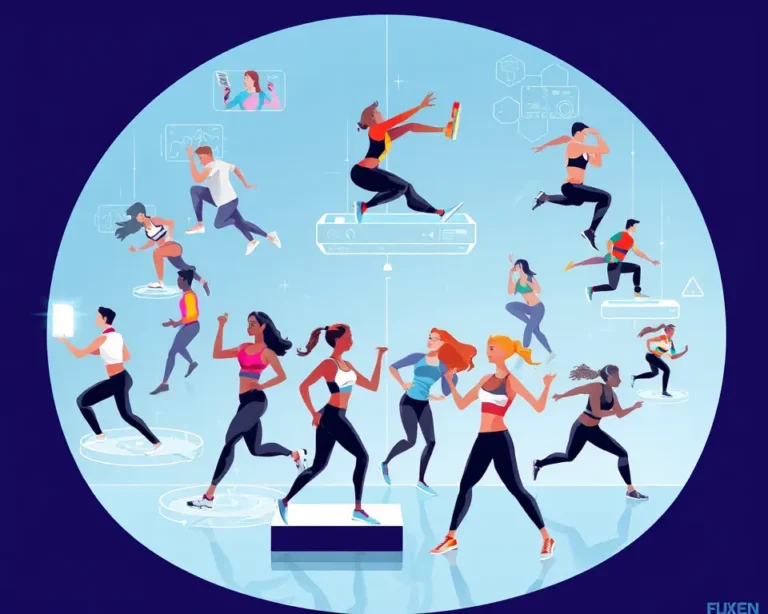The fitness and wellness industry is experiencing a period of unprecedented innovation, driven by technological advancements and a growing consumer focus on holistic health. As we move into 2025, several companies are at the forefront of this transformation, developing cutting-edge products and services that are redefining how people approach their health and wellbeing. This article explores some of the most innovative fitness and wellness companies making waves this year.
AI-Powered Personalization Takes Center Stage
AI-Driven Fitness Apps
Artificial intelligence (AI) is no longer a futuristic concept; it’s rapidly becoming an integral part of the fitness experience. Companies are leveraging AI to create personalized workout plans, provide real-time feedback on form, and even offer customized nutrition advice. Apps like FitGenie are utilizing intelligent algorithms to tailor fitness and nutrition plans based on an individual’s specific needs and goals, eliminating the guesswork from personal well-being. This level of personalization ensures that fitness routines remain effective and engaging, adapting dynamically to the user’s progress.
AI in Personal Training
AI is also transforming the role of personal trainers, empowering them with data-driven insights to enhance client experiences. AI tools analyze client preferences, performance, and physiological responses to create customized workout and nutrition plans that adapt to individual needs. This allows trainers to provide a more personalized service, even when working with clients who have unpredictable schedules, by automatically adjusting programs to account for missed sessions and optimize future workouts.
The Rise of Wearable Technology
Advanced Fitness Trackers
Wearable technology continues to be a driving force in the fitness industry. In 2025, fitness watches, biosensors, fitness rings, and heart rate monitors provide valuable data on performance, wellness, and recovery, enabling professionals to offer more personalized, data-driven coaching. These devices not only track metrics like heart rate, calories burned, and sleep patterns, but also offer insights into stress levels and recovery rates, providing a holistic view of an individual’s health.
Smartwatches and Health Monitoring
Companies like Garmin are leading the charge with new iterations of popular smartwatches that offer enhanced battery life, more rugged designs, and advanced features like built-in flashlights and contactless payment systems. These smartwatches are becoming more sophisticated, tracking everything from heart rate variability and sleep quality to blood oxygen levels and stress, allowing trainers to create customized programs focused on recovery and mental health.
Wearable Integration with Fitness Equipment
Fitness equipment is also becoming more connected, seamlessly integrating with wearable technology to provide a comprehensive picture of a user’s well-being. Machines like smart stationary bikes and treadmills integrate with online platforms, offering live and on-demand workout classes. These devices are becoming increasingly feature-rich, offering virtual coaching, gamification elements, and interactive community features.
Digital Health Platforms Revolutionize Access
Telehealth and Remote Patient Monitoring
Digital health platforms are revolutionizing access to care, providing solutions that address gaps in healthcare and enable patients to manage their health from the comfort of their homes. These platforms offer features such as remote patient monitoring (RPM), allowing providers to track a patient’s cardiac activity, blood sugar levels, and other biological functions in real time using smart implants and wearable devices. This capability is crucial for managing chronic conditions and improving a patient’s quality of life.
Holistic Well-being Apps
A growing number of individually tailored apps and digital platforms will give patients more control over their medical conditions, predict flare-ups, and suggest real-time interventions. Companies are developing apps that take a holistic approach to wellness, offering features like mood tracking, gratitude journaling, and therapy session reminders. Platforms such as GoodLiife Score App assess various aspects of life such as mental health, physical fitness, and relationships, providing a personalized scorecard that reflects the user’s overall well-being.
Mental Health Support Through Technology
Mental health is gaining more prominence within the fitness and wellness industry, with several apps designed to support mindfulness and reduce stress and anxiety. Apps like Headspace offer guided meditations, sleepcasts, and focus music, while apps like Wysa use AI-powered chatbots to provide emotional support and utilize cognitive behavioral therapy (CBT) techniques.
Innovative Fitness Equipment and Home Solutions
Smart Home Gyms
The trend toward home fitness solutions has continued to grow since the pandemic, with many consumers investing in home gyms. Companies are producing compact equipment, such as foldable treadmills and multi-functional home gyms, to cater to those with space limitations. Fitness machines are integrating with online platforms, providing live and on-demand workout classes, virtual coaching, and community features.
Mind-Body Equipment
Fitness is no longer just about physical health; mental well-being is equally important. The rise of mindfulness practices like yoga and meditation is driving demand for equipment designed to support these activities. This includes equipment like balance boards, Pilates machines, and yoga mats that now incorporate digital elements offering guided meditation, breathing exercises, and stress-relief techniques.
Advanced Home Cardio
Companies are developing innovative home gym equipment that combines cardio with advanced features, such as Welcare’s WC6044 Elliptical Cross Trainer, which functions as both an elliptical and stationary bike. This type of equipment often includes adjustable resistance systems and LCD monitors for tracking workout metrics.
The Evolution of Wellness Retreats
Personalized and Luxurious Retreats
Wellness retreats are evolving, offering personalized experiences that combine ancient traditions with cutting-edge modern medicine. Retreats are set in stunning locations around the world, from the beaches of the Maldives to the landscapes of Thailand, offering immersive experiences with personalized treatments, often in open-air treatment areas.
Focus on Holistic Healing
Retreats are taking a holistic approach to healing, often incorporating elements of local traditions and ingredients. For example, Di’a Spa in Indonesia draws inspiration from the island of Flores, providing treatments that combine local ingredients with traditional rituals. Retreats also increasingly focus on mental and emotional well-being, offering meditation and stress-relief exercises alongside physical fitness activities.
Retreats for Specialized Needs
There is a growing demand for retreats designed to address specific needs. For example, some retreats offer support for individuals navigating perimenopause and menopause, providing workshops on hormones, stress management, and mindset techniques. Similarly, there are retreats designed to help individuals improve their posture using methods that combine Pilates, clinical somatics, and fascia release techniques.
The Future of Fitness and Wellness
The fitness and wellness industry is on a trajectory of rapid innovation, driven by technology and a growing consumer awareness of holistic health. Companies that embrace these trends, prioritize personalization, and integrate both physical and mental well-being will continue to lead the way in 2025 and beyond. This new era of fitness and wellness promises to empower individuals to take control of their health journey, offering more accessible, effective, and engaging solutions.







